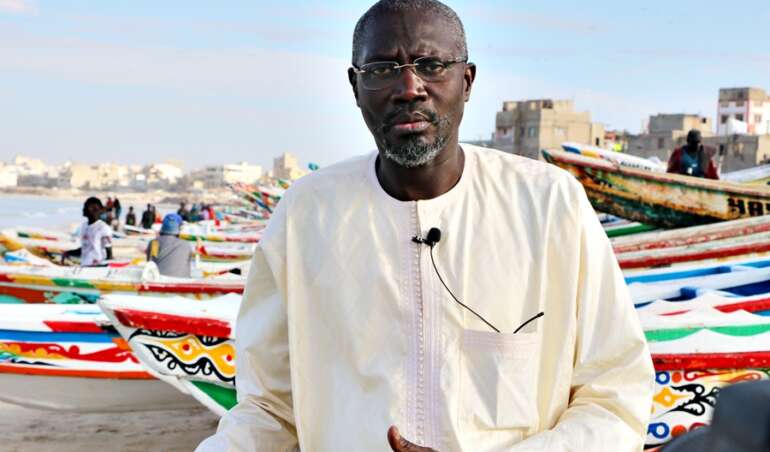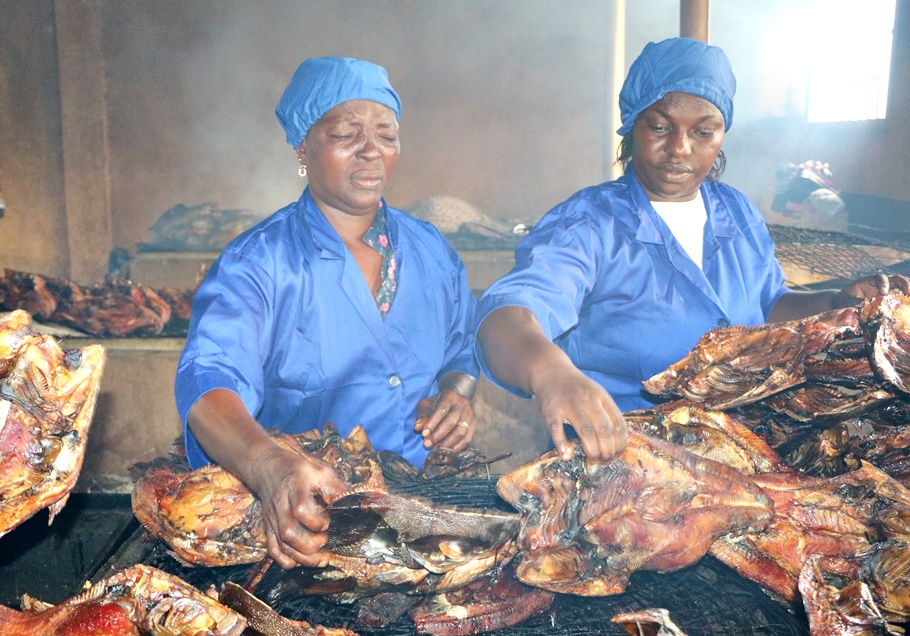In 2017, the seventy-second session of the United Nations (UN) General Assembly proclaimed the year 2022 as the International Year of Artisanal Fisheries and Aquaculture (IYFA 2022). The UN designated FAO as the lead agency within the UN system, in collaboration with other relevant UN agencies and bodies.
Why IYAFA?
The FAO-RAF Chief Representative says that the IYAFA 2022 is an important recognition of the millions of fishers, fish farmers and artisanal fishery workers who provide safe and nutritious food to billions of people and contribute to the achievement of sustainable development goals, including Zero Hunger.
 “The Year aims to draw the world’s attention to the role that artisanal fisheries play in food and nutrition security, poverty eradication and the sustainable use of natural resources, thereby increasing global understanding and action to support fishing communities,” says Dr Ndiaga GUEYE.
“The Year aims to draw the world’s attention to the role that artisanal fisheries play in food and nutrition security, poverty eradication and the sustainable use of natural resources, thereby increasing global understanding and action to support fishing communities,” says Dr Ndiaga GUEYE.
To make the most of this opportunity, Dr. Gueye advocates thinking creatively, joining hands and putting in place an agenda of concrete actions to make IYAFA 2022 a year to remember.
How is the IYAFA governed?
Two bodies are coordinating the oversight and management of this International Year: The IYAFA 2022 International Steering Committee and the FAO IYAFA Secretariat.
IYAFA 2022 International Steering Committee is composed of state representatives from each of the seven FAO regions, as well as non-state actors from the UN system, NGOs, civil society organizations, academia and research, and the private sector. They are responsible for promoting the implementation of IYAFA 2022 by providing guidance and assistance, mobilizing political and financial support and facilitating regional efforts to celebrate IYAFA 2022. Peru chairs the International Steering Committee and the International Planning Committee for Food Sovereignty (IPC) Working Group on Fisheries serves as vice-president.
FAO IYAFA Secretariat is made up of FAO staff from the Fisheries and Aquaculture Division, the Office of Communication and the Partnerships and Outreach Unit. Their role is to coordinate the development and implementation of IYAFA activities, as well as to carry out the administrative tasks necessary for the smooth running of the Year.
 Thus, an indicative list of tools and activities is given for each pillar, to encourage stakeholders to develop activities on each theme. Some of these tools and activities are indicated in the Global Plan of Action, which aims to inspire, firstly, the promoters of small-scale fisheries and aquaculture, and secondly, national administrations, non-governmental organizations (NGOs), civil society organizations (CSOs), private companies, development agencies and intergovernmental bodies.
Thus, an indicative list of tools and activities is given for each pillar, to encourage stakeholders to develop activities on each theme. Some of these tools and activities are indicated in the Global Plan of Action, which aims to inspire, firstly, the promoters of small-scale fisheries and aquaculture, and secondly, national administrations, non-governmental organizations (NGOs), civil society organizations (CSOs), private companies, development agencies and intergovernmental bodies.
Among these is the African Confederation of Professional Organisations of Artisanal Fisheries (CAOPA). CAOPA’s commitment is reinforced by the FAO’s proclamation on 22 November 2017; 2022 as the International Year of Artisanal Fisheries and Aquaculture (IYAFA 2022).
For CAOPA, IYAFA 2022 is an “opportunity to highlight to the general public and governments the importance of adopting specific public policies and programs to promote sustainable small-scale fisheries and aquaculture“.
Today, artisanal fisheries are better recognized at the international level, through the FAO’s Voluntary Guidelines for Sustainable Small-scale Fisheries, and through the United Nations’ Sustainable Development Goals, which call on all countries to “Ensure access to resources and markets for artisanal fishers“.
As the world prepares to celebrate artisanal fisheries and aquaculture throughout 2022, CAOPA members met to define three priority areas for action:
 The first priority, says CAOPA President Gaoussou Gueye, “is for states to preserve and protect exclusive fishing rights for artisanal fishers in coastal areas.”We also ask that these areas be fully co-managed with artisanal fishers, including protected marine areas,” he adds.
The first priority, says CAOPA President Gaoussou Gueye, “is for states to preserve and protect exclusive fishing rights for artisanal fishers in coastal areas.”We also ask that these areas be fully co-managed with artisanal fishers, including protected marine areas,” he adds.
The second priority is to “improve the living and working conditions of women throughout the sector, and better involve them in professional organizations and decision-making processes“.
CAOPA’s third priority is to “protect African artisanal fisheries from other sectors of the blue economy, which threaten the coastal environment, and are much less important for food and nutritional security and employment in our countries“, says President GUEYE.
What are the expectations of CAOPA women for IYAFA?
“At the beginning of this Year, we have to be ambitious,” says CAOPA’s Women’s Programs Coordinator.
Because, says Ms. DION SOMPLEHI Micheline: “Providing decent living and working conditions for women in artisanal fisheries is essential if we want sustainable artisanal fisheries. Guaranteeing women’s access to fish, through fishing policies that protect resources, is essential for sustainable artisanal fisheries. Encouraging, through appropriate investments, the processing of fish for human consumption rather than for meal is essential for sustainable artisanal fisheries.”
Finally, Ms. SOMPLEHI recommended that her sisters think about how to better organize themselves in order to be heard during IYAFA 2022. And also, to think about what they want to promote during the international year.
It should be recalled that FAO, on the occasion of the celebration of World Fisheries Day on 21 November 2021, launched the International Year of Artisanal Fisheries and Aquaculture (IYAFA 2022) in virtual mode. The launch was the occasion for the award ceremony of the Margarita Lizarraga 2020 medal.
By Aliou DIALLO



